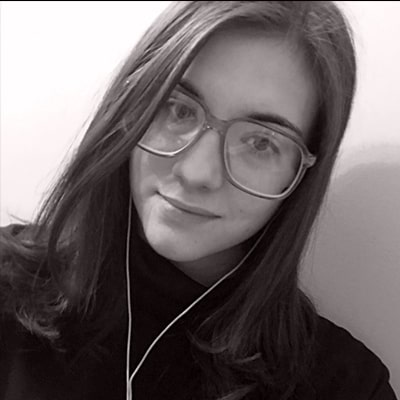Doctors told the 18-year-old gunshot victim that her eyesight would not likely improve much beyond a year – “but they were wrong,” says smiling Joliet, Ill. resident Evelyn Bunte, now age 20 and enjoying quality life again.
“I am able to read, write and sew again.”
That’s because Evelyn underwent a unique testing and evaluation protocol at the Mind-Eye Institute in Northbrook, Ill. and was prescribed a special set of ‘brain glasses' that she says have literally “put my life in a better place.” Shot several times in the head and face in Texas in November 2016, Evelyn was left “totally blind” and paralyzed on her right side. One of the bullets pierced the brain’s occipital lobe, which controls eyesight.
“Eventually, my sight – and physical abilities began returning, but I was still left with black spots and tunnel vision,” she states. “Initially, I could not read or write at all, and my impaired eyesight even made walking difficult. At home, I had to slide down the stairs on my buttocks.”
While still in a Texas hospital, a neurologist reportedly told her that her vision would only improve to a point. “He said that whatever eyesight I had a year following the shooting would be pretty much what I would be left with,” Evelyn says. That prediction proved wrong.
In the fall of 2017, a family friend recommended Evelyn visit the Mind-Eye Institute and schedule an appointment with institute director and founder Deborah Zelinsky O.D., an optometrist noted worldwide for her work in neuro-optometric rehabilitation.
“Before then, I had been checked by a regular eye doctor and prescribed glasses, but I still had difficulties with vision,” Evelyn says.
Dr. Zelinsky ran Evelyn through a series of tests that included her patented Z-Bell Test®. The Z-Bell has become internationally recognized by eye experts and scientists for the way it evaluates patients’ ability to integrate spatial localization in both visual and auditory systems.
“Dr. Zelinsky first had me close my eyes while wearing my regular glasses – the ones my eye doctor had prescribed. She rang a small bell near me, and, with my eyes closed, I had to reach out and touch the bell, but I couldn’t do it. I kept missing it,” Evelyn relates.“Then, with my eyes still closed, she put a different set of lenses on me and tried various colored filters over the lenses. Suddenly, I started hitting the bell. It was crazy.”
The right mix of filters, lenses and/or prisms can readjust a patient’s visual balance and eye-ear connection by altering the way light disperses across the retina, Dr. Zelinsky says.
“The retina is a piece of brain tissue. That’s why changes in luminance on the eye will affect how the brain interprets and reacts to information about the environment and can impact a person’s spatial awareness, movement and selective attention to sound,” Dr. Zelinsky explains.
Unlike eyeglasses that merely correct central eyesight, eyeglass prescriptions developed through the Z-Bell Test® are therapeutic, bringing patients like Evelyn relief for a range of symptoms caused by eye-ear imbalances, brain injuries and other neurological issues, including learning problems.
Since her visits to the Mind-Eye Institute, Evelyn has become employed and is now planning to go to college in August (2019). She thanks the “technology developed by Dr. Zelinsky” for the turnaround in her life.
“My recovery has been, well, pretty amazing,” Evelyn says.

Success Stories, Traumatic Brain Injury
‘Brain’ Glasses Help Shooting Victim Read, Write Again
Mind-Eye Institute Testing Puts Patient on Road to ‘Amazing’ Recovery
